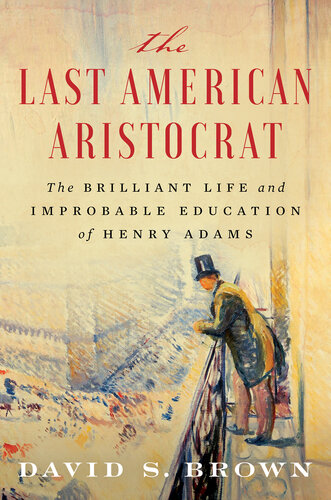
The Last American Aristocrat
The Brilliant Life and Improbable Education of Henry Adams
کتاب های مرتبط
- اطلاعات
- نقد و بررسی
- دیدگاه کاربران
نقد و بررسی

June 1, 2020
A biographer of F. Scott Fitzgerald and Richard Hofstadter, Brown here chronicles Henry Adams, a Gilded Age intellectual who exemplifies the man of letters and whose The Education of Henry Adams is a classic. With a 60,000-copy first printing.
Copyright 2020 Library Journal, LLC Used with permission.

September 1, 2020
A fresh, top-notch biography of Henry Adams (1838-1918). Noted historian Brown once again trains his perceptive eye on a major American thinker. As a member of a powerful political family, Adams possessed the strengths and prejudices of his class, and his work both chronicled and reflected the decline of the Boston-centered gentry. Elevating self-pity--what Brown calls his "sense of displacement"--into a unique sensibility and generalizing from it, Adams made irony into a distinctive, signature style. His principal historical works--those about the Jefferson and Madison administrations and Gothic culture--are unrivaled masterpieces. Yet despite a backward-looking mind, Brown notes that Adams also evinced traits of a modern man who, despite his often suffocating emotionlessness, responded to new experiences and historical developments with an open mind--but always critically. Unfortunately, like most members of his class and circle, he was also deeply anti-Semitic, ethnocentric, anti-labor, and racist. "I believe," writes Brown, "that to understand much of America's history, and more specifically its movement in the late nineteenth century toward an imperial, industrial identity, one both increasingly beholden to technology and concerned with the fate of the white race, is to understand Henry Adams." The author presents his "critical profile" of Adams, a man of "fluidity of identity," with the acuity that marks his earlier works. Few write so confidently of the American historical writings produced by both academic and freelance writers. When Brown leaves American precincts, as he must to write about Adams' late-life masterpiece, Mont Saint Michel and Chartres, he is less sure-footed, but that weakness only modestly mars the book's many strengths. It takes up easy company with related works on Adams by Ernest Samuels, Garry Wills, and Edward Chalfant. In deftly capturing a man of enormous scholarly achievement, near-tragic limitations, and symbolic significance in American history, Brown gives us another fine biographical study. A splendid addition to the shelf of books about a distinctive, ever elusive figure in American history.
COPYRIGHT(2020) Kirkus Reviews, ALL RIGHTS RESERVED.

Starred review from September 14, 2020
Historian Brown (Paradise Lost: A Life of F. Scott Fitzgerald) delivers a splendid biography of Harvard professor and memoirist Henry Adams (1838–1918). The direct descendant of two presidents and a diplomat, Adams, who is best known for his autobiography, The Education of Henry Adams, sardonically referred to himself as a “failure.” Yet he managed to emerge from his prominent family’s shadow and make a worthy and memorable life for himself, Brown reveals. He vividly describes Adams’s milieu during a period of sweeping social change in America, detailing his marriage to socialite and photographer Marian “Clover” Hooper, who committed suicide in 1885; his friendships with Henry James, Edith Wharton, and Henry Cabot Lodge; and his travels in Cuba, Japan, Russia, and the South Pacific. Brown also tracks how Adams’s views on the Civil War shifted during his tenure as his father’s personal secretary in London, and notes his stances against the spoils system, the gold standard, and imperialism, as well as his ethnic and racial prejudices. The fully fleshed-out Adams that emerges in these pages is irascible, self-contradictory, and always fascinating. Readers will be thrilled by this standout portrait of the man and his era. Agent: Chris Calhoun, Chris Calhoun Agency

October 1, 2020
In 1999, a Modern Library poll picked The Education of Henry Adams as the best nonfiction English language book of the twentieth century, a singular achievement for a posthumous memoir published in 1918. Historian Brown's new book plumbs the mind of its author, Henry Adams, grandson and great-grandson of presidents, who never held public office but manifested his brilliance in his historical works. Brown, who expertly places Adams in the context of his time, shows how Adams shaped his distinctively detached and ironic point of view. He tracks Adams' developing conviction that industrial modernism would cause the decay of western civilization and deconstructs Adams' nineteenth-century attitudes (he was wary of abolition and Reconstruction and anti-Semitic). Brown calls his book a critical profile and is less interested in Adams' personal life, his relationship to his parents, and his marriage to the brilliant and self-destructive Clover Adams than in his intellectual life. The question of why contemporary readers admire Adams' masterwork is not fully explored. This book should be regarded as a companion to other biographies of a landmark American thinker.(Reprinted with permission of Booklist, copyright 2020, American Library Association.)

























دیدگاه کاربران